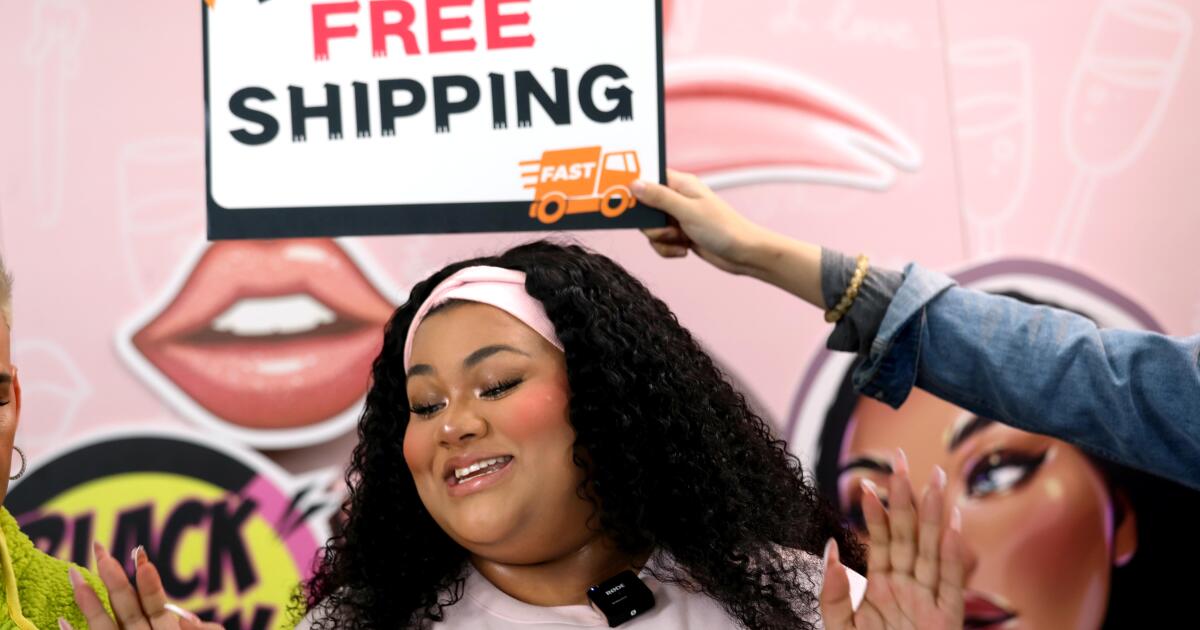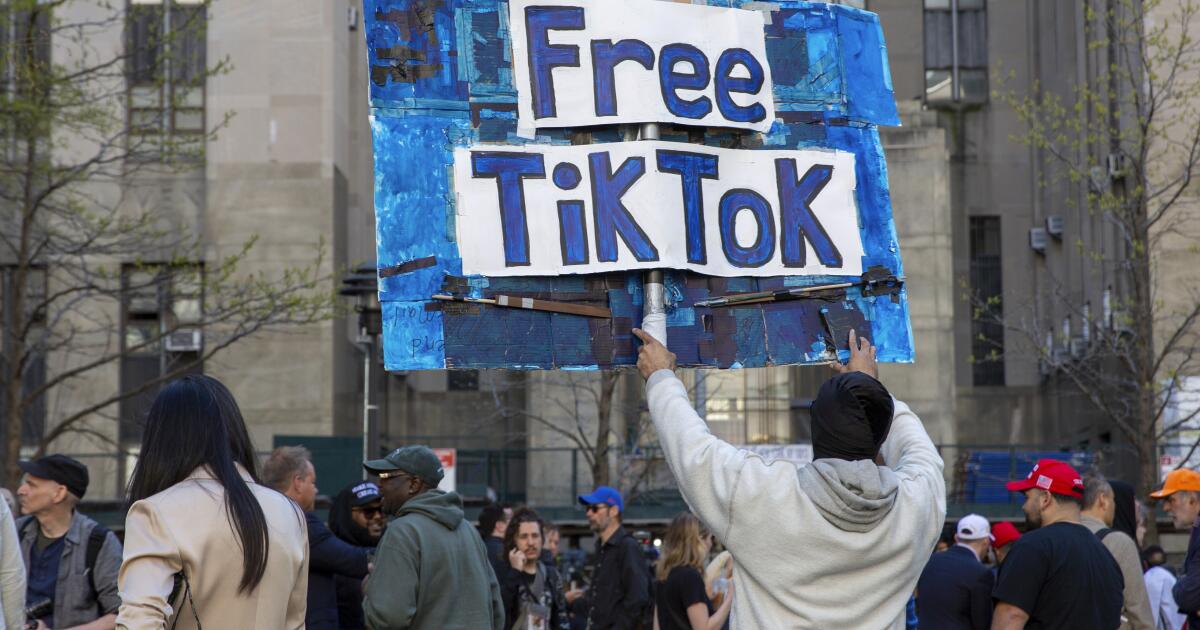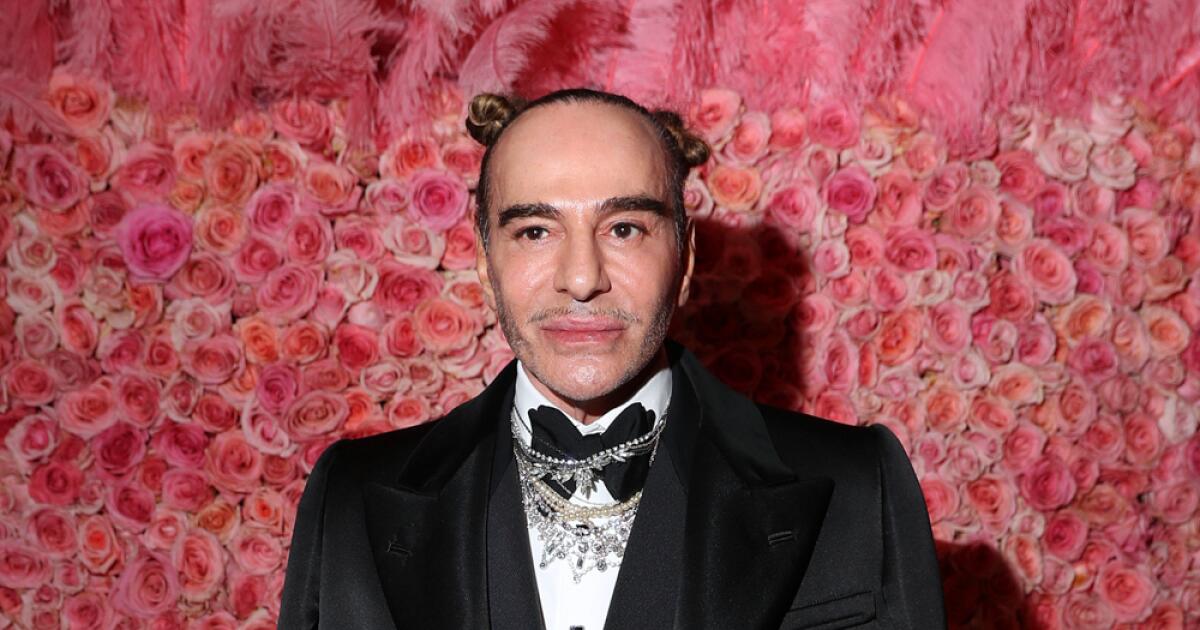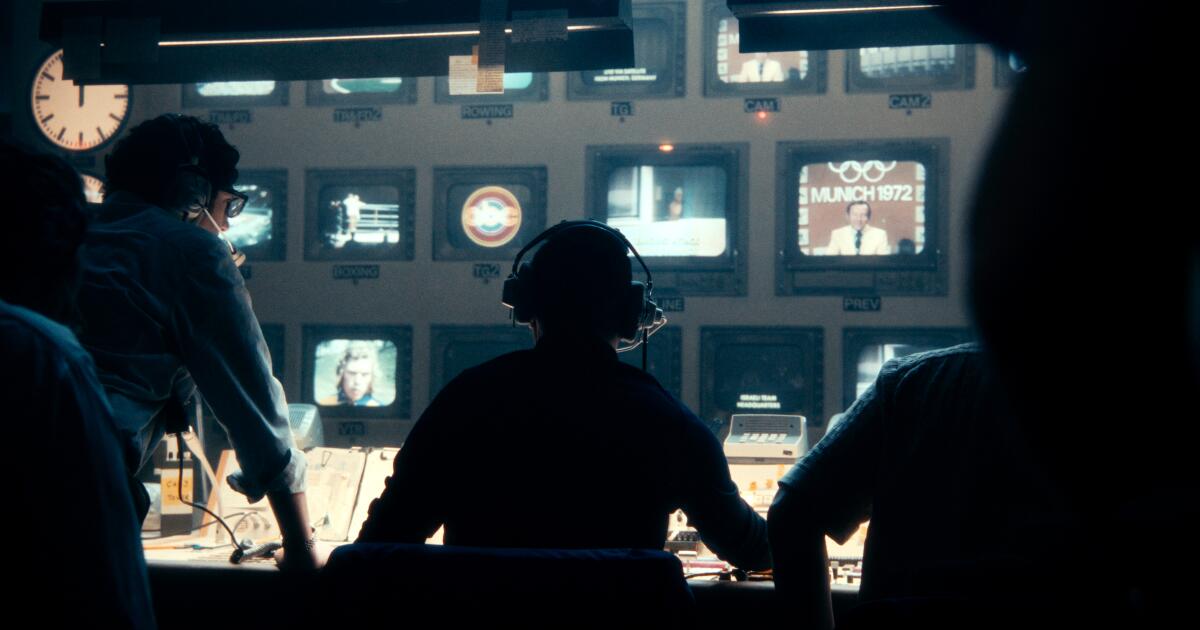Part practical problem-solver and part esoteric theoretician, Brian Eno has been involved as a musician and producer on some of the most influential music of the past 50 years, a daunting list of collaborators that redefined pop: Roxy Music, David Bowie, Talking Heads, Devo and U2. As a solo artist, Eno pioneered the genre of ambient music. He has also extended his work into the visual arts, creating installation pieces.
The new documentary “Eno,” directed by Gary Hustwit and premiering today at Sundance, is an unusual portrait of an artist — the first on its subject. The project utilizes a custom-built generative artificial intelligence engine that selects footage and changes edits so the film is different every time it is shown.
“The generative approach was something that was really organic to what he’s done,” said Hustwit on the pairing of subject and form. “He’s been very much an early adopter to new technology and ways to integrate it into the creative process. So approaching a movie about him that way made sense.”
The film draws from some 500 hours of footage from Eno’s own archives, along with original interviews with the artist himself. Hustwit worked with artist and technologist Brendan Dawes in creating the engine that would generate the film from what was fed into it. Certain scenes could be pinned to arrive during specific sections, while an overall shape to the film could be maintained even as the order and selection of material would change each time a new version is generated.
The filmmakers do maintain an element of control in the creation of the film — Maya Tippett and Marley McDonald are credited as editors — and watching it feels less channel-flippingly random than you might expect. A section on Eno’s time with Roxy Music comes at minute 10 or at minute 30 and a viewer is then left to process that information within the larger story accordingly. Inevitably, something will feel missing or left out.
For Sundance, Hustwit is creating different files for each of the film’s screenings. New footage will be added to the engine even after the premiere, so the doc will continue to evolve.
Hustwit and Eno first collaborated when Eno composed music for Hustwit’s 2018 profile “Rams,” about the industrial designer Dieter Rams. Around that same time, Hustwit was looking for ways to rethink how to make movies.
“I was just getting bored with the form of cinema and wondering why it couldn’t be more like music, more performative, like every time you pressed play, I would be surprised along with the rest of the audience about what was on the screen,” said Hustwit. “After meeting Brian and working with him, seeing how he’s using generative technology too, it just seemed to make sense.”
For fans curious how many times they would have to watch the movie to see all the possible footage, they may be watching for quite some time.
“The answer is, I don’t know,” said Hustwit, “which is kind of the beauty of the whole generative approach.”
From his studio outside London, Eno, 75, recently took a break to speak over Zoom about the documentary, his thoughts on AI and his long and storied career on the bleeding edge.
An image from the documentary “Eno.”
(Film First / Brain One)
When you got involved in this project, was the generative aspect of the movie already part of it?
Yes, and it was actually a key part for me. Because I so despise [films] about artists. They’re always rubbish, in my opinion. Nearly all documentaries about artists are so awful because they always take this line. And you think: Who decided this was the particular view you should take of that person’s life? And of course if it’s about rock musicians, it’s always glamorous and full of fascinating and glitzy things. And I think I know a lot of musicians and I know what their lives are like, and they aren’t generally like that. So that’s sort of why I’ve resisted ever having a documentary made before, because I just can’t bear most of them. I start throwing things at the television with most of them.
So I thought, well, this sounds like a better approach to actually make a generative piece where it will be different every time. Which is of course how it is in memory as well. It’s only if you keep a diary regularly, which I do, that you realize how fallible your memory is. You have a memory of a time in your life and then you look back to the diary and you realize you had a completely different experience from what you later imagined you were having.
So it doesn’t bother you at all that people at different screenings are going to get different versions of your story? No one will receive the definitive Brian Eno bio.
No. And I’m very glad they won’t. I don’t want there to be a definitive one. If they act as though they’re definitive, they’re always disappointing. There’s always something that got missed that you thought was important or something else that got overemphasized that you didn’t think was very important.
I don’t know what I may have missed, but one thing that really comes across in the version I saw is your love of nature. You’re thought of as this person who has a very technology-driven approach to your work. Can you talk about how the natural world is an influence on what you do?
Well, I grew up in the countryside, so I didn’t move to London until I was 21. And prior to that I lived in small places, basically. And so most of my dramatic early experiences were to do with nature, actually, or to do with art. The thing that excited me most when I was young was either going for walks by the river or listening to music or looking at paintings. Those were the touchstones for me. And I would visit the same places again and again. There’s a place called Kyson Point on the River Deben that I used to go to often. The experience of that kind of visit is that you go to the same place and of course it’s always different. It’s different every time you’re there.
And so if you keep visiting a place you become very alert to the small differences. So that became part of my idea of what having a good time consisted of, the right mixture of expectation and surprise. You don’t want total chaos every time, but you don’t want total familiarity either. So that sort of became a theme for me in the work that I subsequently did. In fact, I remember writing a long time ago when I was 19 or so, I want art to be like sitting by a river.
In fact, Robert Rauschenberg said something similar as well. He said: I want art to be the kind of experience I like, like walking down the street. So it’s this feeling of something between the commonplace and the magical, or finding the magical in the commonplace, finding what is special about this moment in time, in this place that you’ve been to many times.
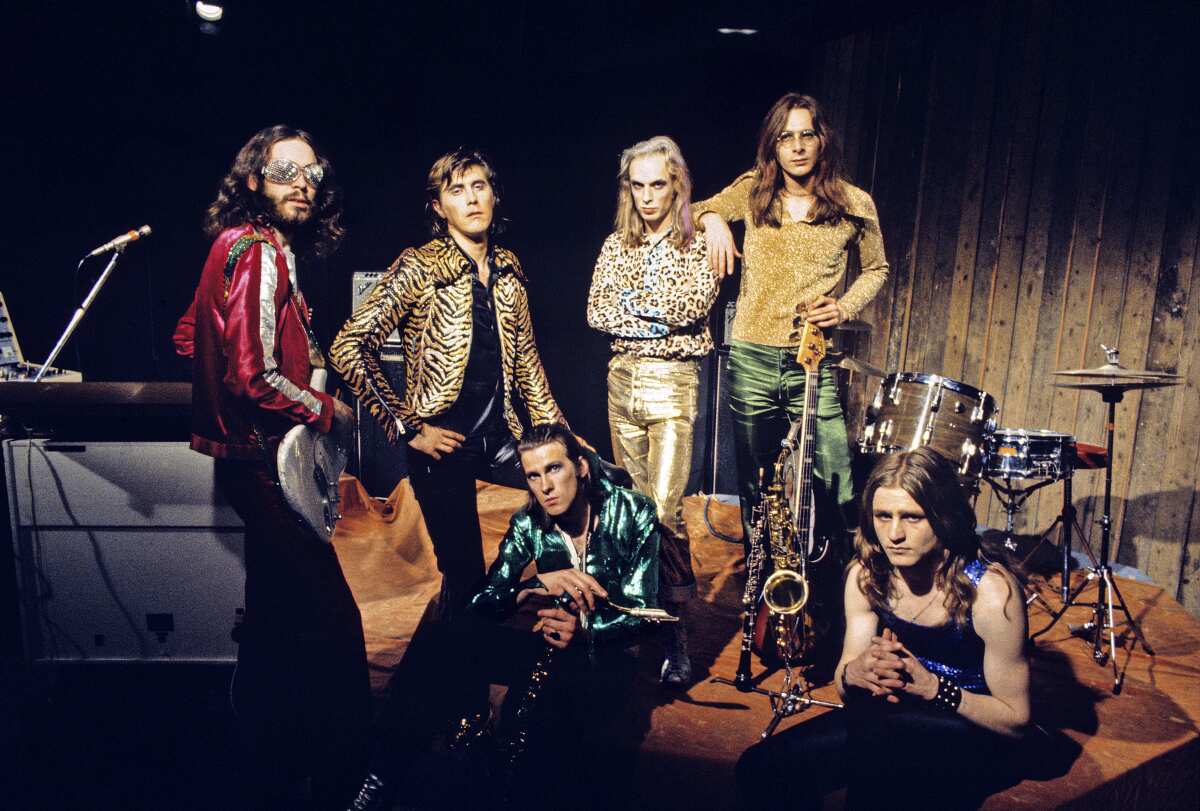
From left, the members of Roxy Music: Phil Manzanera, Bryan Ferry, Andy Mackay (seated), Brian Eno, Rik Kenton and Paul Thompson (seated) in London 1972.
(Brian Cooke / Redferns)
In “Eno,” there’s a bit of interview footage with David Bowie and he says, “I’m not quite sure what it is that Brian does.” I’m wondering how you feel about that, that your contribution as a producer can remain abstract even to your closest collaborators.
And to me. I always say to people: Chemistry is an important model for this. You know, steel is only iron with 2% of carbon added. It appears you just add 2% of this other element, the carbon, and suddenly you’ve got something that behaves entirely differently. So sometimes it’s quite a light touch on something that transforms it into something else.
And sometimes it’s hard to remember in the making of something where those moments of significant change occurred, because they might not have been very exceptional-looking at the time. It might have been somebody saying, “Shall we stop for 10 minutes?” Sometimes that’s a very important creative decision because when everybody comes back 10 minutes later, they’re in a different mind and suddenly things fall into place differently.
So sometimes my contribution might have been as minimal as that, just saying, “Shall we stop for a few minutes?” Or it might have been saying, “Shall we try to make five new pieces in the next hour? Let’s see, let’s see if we can do it. Five new pieces in the next hour. Let’s go.” Sometimes that kind of shock to the system creates something new. And then of course, other times I work like a normal musician. I say, “Why don’t we have a G major instead of that B minor” or whatever. In fact, I nearly always say that, “Why don’t we have a major instead of a minor?” It’s part of my destroy-minor-chords crusade that has been going on for 50 years or so.
To return to talking about the use of generative AI in the movie, I’m talking to you from Los Angeles, where the writers and actors strikes happened in Hollywood last year. A big part of that was over the use of AI. What would you say to people who are concerned about the use of AI in creative endeavors?
Actually, I have quite a lot to say about that. The first thing I’d say is that by now we should be quite used to the idea that most of the systems we use are beyond our understanding. Just think about airlines. We completely trust how the system works. We have no idea at all how the systems work. We’re sitting in something that was built by maybe a hundred thousand people. If you think of all of the different types of intelligence that go into designing an airplane and getting it in the air and running an airport and making sure that all the communications that run from ship to ground are safe and so on — nobody has a complete picture of anything like that anymore. So one of the objections to AI is, “Oh, we just can’t understand how it works. We don’t know how these decisions are arrived at.”
We don’t know how any decisions are arrived at. If you think from the moment you get up in the morning, you turn the tap on to make a pot of tea, you don’t know where the water comes from, you don’t know how it’s processed, you don’t know how plumbing systems work. You don’t know where the tea comes from. You don’t know how the retail organizations work, and so on and so on. So we should be completely used to the idea of not being in control in that way. So that’s one objection to AI which I think we can disregard.
The other one is whether they will take over and control us and replace us. Well, the only thing that really worries me about AI is who owns it. And if it’s in the hand of Silicon Valley frat boys, I’m seriously troubled. If it’s in the hands of people like [Mark] Zuckerberg and [Elon] Musk and all that other group of people, then I think we’re in trouble because I don’t trust them to make the momentous decisions that they’re being called upon to make.
In a way, the mistake is a social one. We should not have allowed a situation where those very big decisions, which will affect all of our futures quite a lot, are in the hands of a very small number of completely unelected people. I didn’t vote for Mark Zuckerberg or Elon Musk. I admire them in many ways and think they must be very clever guys. But to find that our societies are being pretty much run by their particular preferences and prejudices is worrying, I think.
The only thing that really worries me about AI is who owns it. And if it’s in the hand of Silicon Valley frat boys, I’m seriously troubled.
— Brian Eno
And so what is there to be done about that? How do you draw the distinction between creative applications of AI versus the more destructive ones?
Well, I’m a socialist, which is very unpopular in America, I know, but I am one. And I think that all of these things should be a kind of commons. There used to be lots of commons. We all used to participate in them, in the distant past, and then in the 18th century in England, we had something called the enclosures, which was where wealthy people would suddenly put a fence around a bit of it and say, “No, that’s not a commons anymore. That now belongs to me.” Well, the history of technology in the 20th and 21st century has been that more and more of what used to be commons has become private.
And that means that you have to rent it. The commoners now have to pay for something that you used to be able to share for free. So I want to see far more commons. I want to see an internet that is kind of a commons instead of a fenced-off series of camps. And part of the idea of a commons is an idea that used to, I think, enthuse people at the beginning of the internet period, which is the idea of interoperability, that if you did something here, you could take it over there and it would still work. Well, everything in Facebook and Instagram and so on tries to do the opposite of that. It wants to keep you in one place because that’s where you make the most money for them. So as long as the thing is connected to the profit motive — the profit not of society but of the individuals who own these platforms — then it doesn’t work for me and it will only get worse. It’s what Cory Doctorow calls “enshittification.” A great word. I love that word.
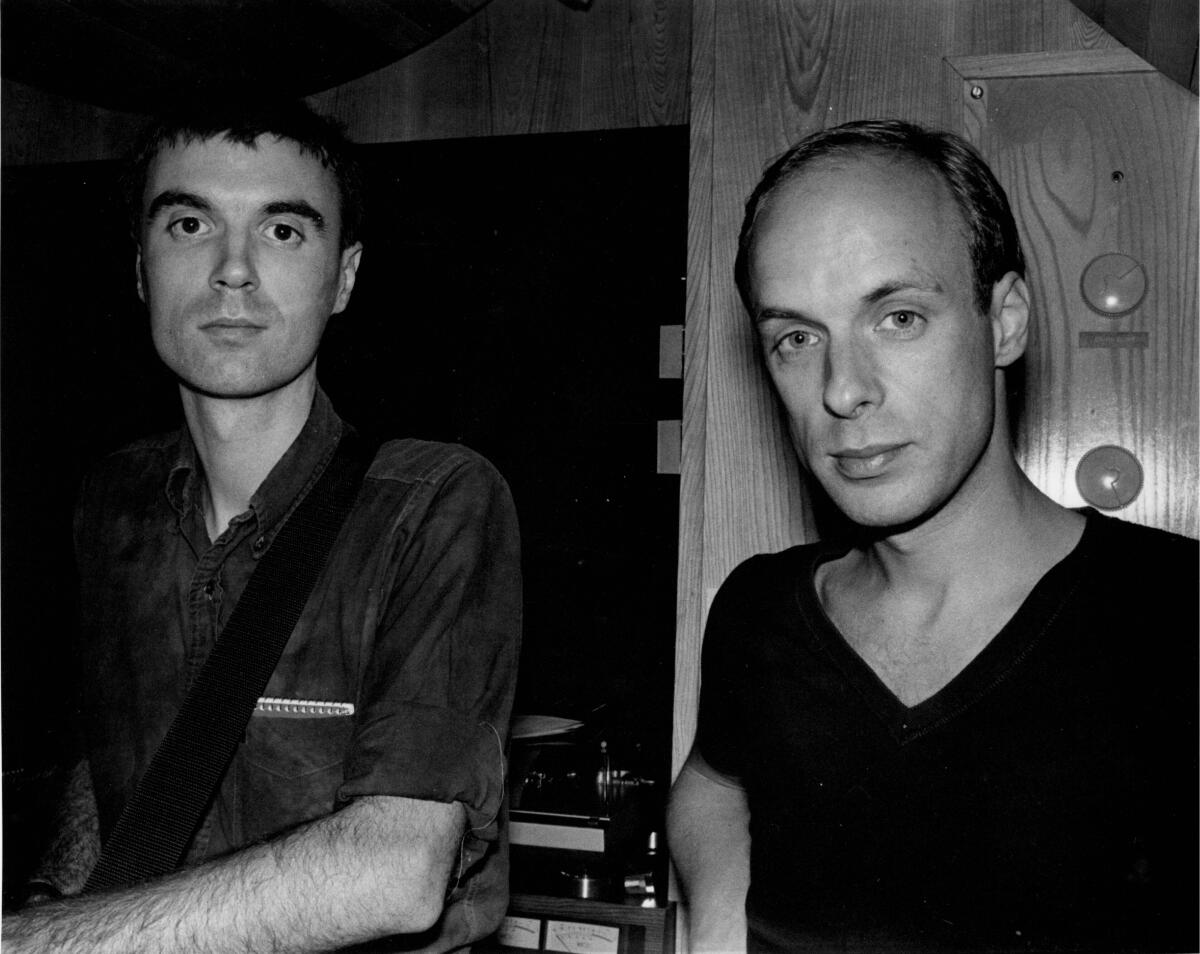
David Byrne, left, and Brian Eno in the recording studio.
(Roberta Bayley / Redferns)
What keeps you creatively engaged and moving forward?
I just can’t imagine what it would be like to retire. And it’s not a heroic mission or anything. I don’t get up thinking I should do something important today. I get up thinking, gosh, a new day, what can I do? What do I want to finish? What do I want to start? So I guess I’m resisting getting old.


